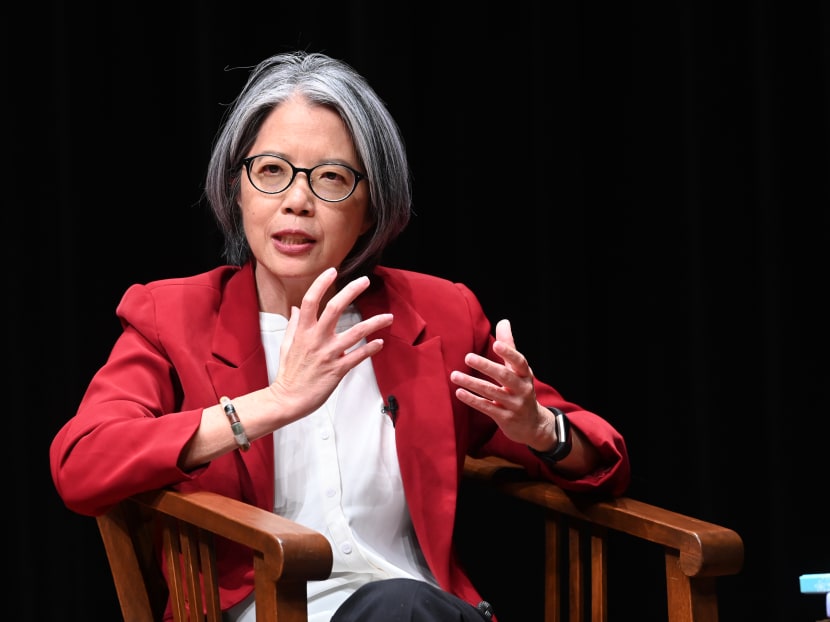IPS lecture: Govt review needed to promote positive masculine norms in S’pore, says Aware executive director
SINGAPORE — To better promote positive masculinity norms among men and boys here, the Government could commission a study on masculinity in Singapore as part of its review on gender equality.

Ms Corinna Lim, executive director of the gender advocacy group Aware, giving the third of the IPS-Nathan lectures on May 24, 2021.
- Ms Corinna Lim called for a study on masculinity to be done as part of the Government’s review on gender equality
- She said this can help promote more positive masculine norms among men
- She pointed out that few studies on men have been done here
- She also renewed calls to expand National Service to include non-combat roles
SINGAPORE — To better promote positive masculinity norms among men and boys here, the Government could commission a study on masculinity in Singapore as part of its review on gender equality.
The suggestion came from Ms Corinna Lim, executive director of the Association of Women for Action and Research (Aware), a gender advocacy group.
She was speaking on Monday (May 24) at a lecture series organised by the Institute of Policy Studies (IPS), a think tank under the National University of Singapore.
In her lecture, Ms Lim laid out the various issues that men face when it comes to their gender, such as the pressure to conform to ideal models of masculinity, facing violence and bullying from other men, and being influenced by pornography from an early age.
The authorities have been collating feedback and recommendations from interest groups and the public as part of the gender equality review, titled “Conversations on Women Development”. This will culminate in a White Paper that will be delivered in Parliament later this year.
Ms Lim said little research had been done on the topic of masculinity in Singapore.
She said a review into some of these issues could be helpful in understanding how these aspects of masculinity impact gender equality here, as well as violence against women, and health issues among men.
She noted that similar reviews conducted overseas such as in the United Kingdom and Canada have been helpful in understanding how to improve gender relations there.
The former lawyer added that the review should include areas such as equality in the family, intimate partner relationships, and the health and well-being of men, noting that suicide rates among men here are double those of women.
Ms Lim was speaking at her third and final lecture as the eighth S R Nathan Fellow for the Study of Singapore at IPS. In the first and second instalment of the series, she spoke about the history and future of the fight for gender equality here, and the care economy in Singapore.
Aside from a review of masculinity in Singapore, Ms Lim also called on the Government to include research into the sexual behaviour and sexual needs of the youth today as part of its gender equality review exercise.
She cited a 2015 study which found that nine out of 10 of teenage boys here have watched or read explicit materials, and are therefore getting their sexual education through pornography, which conveys unhealthy beliefs of sexual relationships.
She added that research has shown that those who watch violent porn were more than six times as likely to engage in sexually aggressive behaviour, and teenagers who frequently watch pornography are predicted to have more sexist atittudes and perpetuate sexual harassment later in life.
Therefore, a review of the sex education curriculum is needed here to impart the “critical life skills that (young people) need to navigate this sexualised world”, and ensure that porn is not the “default educator” for young boys, said Ms Lim.
REVIEWING NATIONAL SERVICE
Ms Lim said that National Service (NS) remains a key obstacle to getting men onboard conversations of gender equality in Singapore, and renewed calls for the authorities to expand NS to include other roles that can also be opened to women.
Aware has long argued for the Government to expand the roles available in NS such that it is not solely focused on military service.
Reiterating this, Ms Lim suggested for NS to allow the option for people to serve in non-combat roles such as social and community work and roles in the healthcare sector.
Alternatively, she said the authorities can review Basic Military Training, and other aspects of NS, to reduce “any unnecessary practice that promotes unhealthy masculinity norms”.
“The equal participation of women in NS will automatically make NS less toxically masculine,” she said.
MORE SUPPORT SERVICES FOR MEN
Ms Lim also suggested that the Government initiate or lend its support to establish more dedicated support services for men, where men can share their difficult experiences and receive support and guidance from their peers.
The men whom she spoke to for the lecture had said that they wished to see more specialised services to support men who are facing stress and challenges in their lives.
“The crisis could be going through a divorce, or being caught for a sexual crime, and it is at these points that we can start to work with men on trying to make sure that they don't go back to these things,” said Ms Lim.
“So it's important to have this service, and it should be designed to take into account masculinity norms, and men's aversion to seeking help.”
Ms Lim said men should not feel judged or shamed when coming forward to use the service, and it should be a place where they can be vulnerable without being shamed or seen as weak.
After the lecture, a question was asked whether women play a part in contributing to “toxic masculinity”, which refers to negative traits that cause harm to men and the people in their lives, such as being violent, emotionally controlling and exhibiting sexually promiscuous behaviour.
Responding to this, Ms Lim agreed that women are “part of the problem” when it comes to reinforcing negative models of masculinity.
“It is not about men or women, it is about patriarchal norms in society which are nested in our heads and in every social interaction that we have with a man or a woman,” she said.
“Women who tease men about being too effeminate — they are part of the problem that is going to make it difficult (for norms to change)... So I think we all have a part to play.”











